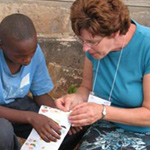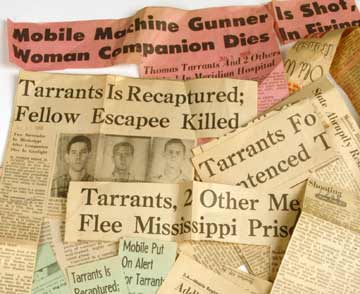Oklahoma Baptist feels called to minister in global hot spots
Posted: 1/18/08
Oklahoma Baptist feels called
to minister in global hot spots
By Ken Camp
Managing Editor
BARTLESVILLE, Okla.—Day 27 of a planned 40-day fast, in a cabin on Michigan’s upper peninsula, Kevin Turner believes God called him to ministry—specifically in war zones, disaster areas and places where Christians are persecuted.
“I believe we’re sent into the hot spots of the world,” said Turner, president of Strategic World Impact, based in Bartlesville, Okla. “Our approach is to get in, be part of the solution, make an impact and get out safely. We’re not doing long-term development. It’s a stopgap ministry to touch the lives of people who are standing on the brink of eternity.”
| A child peers out of a hut not far from Nyala, a village affected by violence in southern Darfur. (RNS photo/Chris Herlinger) |
Over the last decade, that mission has taken Turner and his staff to about two-dozen nations, including multiple trips to Sudan and Eritrea. This month, Strategic World Impact is sending a 20-member medical missions team to Darfur.
| See Related Articles: • Responding to the Luke 4 mandate • Oklahoma Baptist feels called to minister in global hot spots • Hands-on missions in Africa • Caring for the poor: Whose job is it –church or state? |
The United Nations estimates about 400,000 people have died as a result of conflict in Darfur since 2003, and more than 2 million have been displaced.
The Stategic World Impact team—including five physicians associated with In His Image International in Tulsa, one dentist and several nurses, paramedics and disaster relief specialists—plans to deliver 1,000 kits containing tarps, mosquito netting, eating and cooking utensils and hygiene items to displaced people in the war-torn area.
The volunteers, who plan to fly into southern Darfur by way of Kenya on a cargo plane, also will deliver a donated solar-powered water purifier, as well as Bibles for distribution.
“We bring in Bibles because the Christians there ask for them,” said Turner, an ordained Baptist minister. “We never do the kind of distribution where people are told they have to take a Bible in order to get something else they need. … Nobody can accuse us of manipulating people in their time of need.”
Travel costs are significantly higher for this trip than for most missions Strategic World Impact undertakes, Turner noted. The cost of the cargo plane alone is about $34,000, and the organization still lacks about $13,500 to cover expenses, he noted.
“But the Lord always has been faithful to provide, and we’re trusting him,” he said. “This is our chance to get in to Darfur, and we never know how long the opportunity will be available.”
Last April, Turner conducted an on-site assessment in Darfur. He encountered displaced women, children and elderly people who lacked food and water and needed medical attention.
“I saw people walking or crowded onto the back of gravel trucks, fleeing through the desert. There were people who had traveled three days on foot since their last water supply in up to 130-degree temperatures,” he recalled.
Turner acknowledged the safety concerns inherent in ministering in places like Darfur, but he noted Strategic World Impact trains staff and volunteers in how to minimize risks. Still, as the father of three children—ages 11, 14 and 17—he recognizes the danger.
“In our case, the kids haven’t ever known anything else,” he said, noting he and his family lived more than four years in Bosnia, and they also lived in Cairo. “It’s all in what you become accustomed to. It’s a different lifestyle.”
Even so, while he avoids placing himself or anyone else in a risky situation without proper preparation, Turner added, “There’s nothing that can be taken from you when it’s all surrendered to the Lord.”







